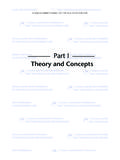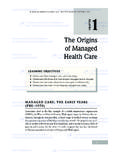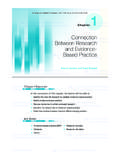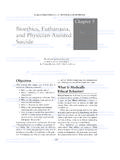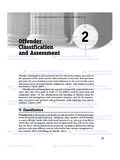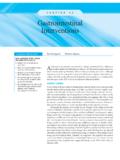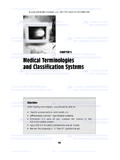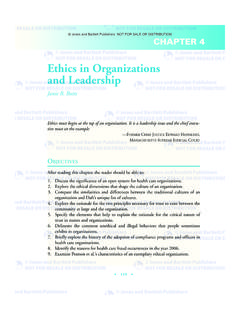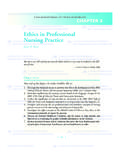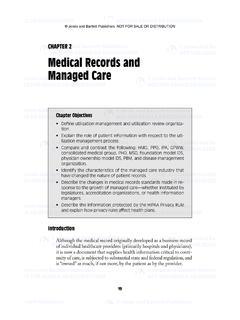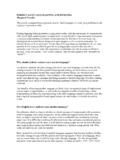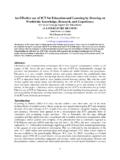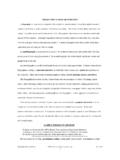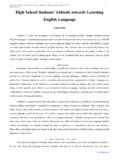Transcription of psychosocial and functional aspects of chronic …
1 N The experience of chronic illness and disabiliTyThe way individuals experience chronic illness or disability encompasses many different areas and is influenced by numerous factors, includ-ing the following: l Personal factors (such as gender, race, age, coping styles, and past experience) l Social and family relationships and social support l Socioeconomic status l Culture l Environment (physical, social, and polit-ical) l Activities (including those related to daily living, recreation, school, and work) l Goals of the individualThe extent to which a health condition is disabling depends on the interplay between the individual s health condition and these factors.
2 Limitations that individuals experi-ence may not be so much a function of their health condition as a function of elements in their environment. Individual reactions to chronic illness and disability vary consider-ably. The individual with a health condition that has associated limitations may not place as much importance on the condition and its associated features as do members of society. Social groups establish their own standards with regard to idealized physical and emo-tional traits, roles, and responsibilities. Indi-viduals with chronic illness or disability who do not fit the societal determined norm may find that, regardless of their strengths and abilities, society as a whole focuses more on the limitations associated with the condition than on what they are actually able to do.
3 People vary in terms of their personal resources such as tolerance to symptoms, functional capacity, general ability to cope, and social supports. Consequently, each indi-vidual must be considered in the context of all aspects of his or her life, and specifically in terms of the individual s capacity to function within his or her capacity goes beyond specific tasks and activities. It also includes significant events and relationships with family, friends, employers, and casual acquaintances. No rela-tionship exists in isolation. Just as individuals reactions to illness or disability influence the reactions of others, so the reactions of others affect individuals self-concept and perception of their own strengths and in family, social, and work activities assumes interaction and the capacity to perform a variety of activities.
4 As interac-tions or capacities change, or as they become limited or restricted, alterations in roles and relationships also occur. Although some changes and adjustments may be made with chapter 2psychosocial and functional aspects of chronic illness and disability Jones and Bartlett Publishers, LLC. NOT FOR SALE OR DISTRIBUTION relative ease, other changes can have repercus-sions in many areas of daily life. The mean-ing and importance that individuals and their families attribute to these associated changes influence their ability to accept the condi-tion and to make necessary adjustments. The health condition itself is only one factor that determines individuals ability to function effectively.
5 Disease and IllnessWords are powerful conveyers of concepts. Using a standard definition of terms facilitates communication and understanding of what each term implies. The term disease is derived from the medical model, which refers directly to changes in structure or function of body systems. The medical model focuses on treat-ment and elimination of symptoms. The term illness refers to individuals perception of their symptoms and how they and their families respond to symptoms they are experiencing (Morof, Lubkin, & Larson, 2002). It is impor-tant to understand both concepts. Professionals working with individuals with chronic illness or disability must understand symptoms, functional ability, and progression of a condition so that they can understand individuals experience, and facilitate their ability to achieve optimal functional capac-ity.
6 Insight into the nature of the individuals health condition helps guide professionals in assessments and interventions as well as in understanding each individual s functional capacity and general experience (Dudgeon, 2002). It is also important for professionals to have insights into individuals perception of their condition, the personal relevance and meaning it has for them, and their goals so that interventions can be directed toward meeting specific needs and goals (Shaw, Segal, Polatajko, & Harburn, 2002). There must be an understanding of the individual s strengths, resources, and abili-ties, as well as how these will affect functional capacity.
7 Professionals also need an under-standing of clients personal factors, activities, and social and physical environments to effec-tively assess how the condition will affect an individual s daily life and goals in relationship to functional capacity at home, at work, and in the Terms Related to chronic Illness and DisabilityAlthough understanding the experience of the individual in regard to his or her health condition is crucial, understanding terms and concepts utilized by the medical community as a whole is also important to facilitate com-munication and avoid misinterpretation. Two key terms that influence the treatment of a health condition by medical personnel are concepts of acute and chronic .
8 Acute refers to sudden onset of symptoms that are short term and affect functional capacity on a short-term basis. chronic refers to symptoms that last indefinitely and are attributed to a cause that may or may not be able to be identified. Some conditions begin acutely but are not resolved, thus becoming ongoing and chronic . When health conditions are chronic , depending on the nature of the condition and the circumstances, activities and participation may be affected and changes in activities may be needed to accommodate manifestations of the condition. In some instances, if symp-toms of the condition progress or as other per-sonal, social, or environmental factors change, accommodations may be needed to manage the condition.
9 The course of an illness over time, plus actions taken by individuals and their families to manage or shape the course of the condition, is called a trajectory (Corbin, 2001). This concept is important to profes-sionals working with individuals with chronic illness and disability because it implies a con-tinuum and emphasizes the social and envi-ronmental effects of the condition. 10 Chapter 2 psychosocial and functional aspects of chronic Illness and Disability Jones and Bartlett Publishers, LLC. NOT FOR SALE OR DISTRIBUTIONThe course of the condition refers to the nature or stages of the chronic illness or dis-ability.
10 Some conditions are classified as stable, meaning that the condition is being managed, symptoms are not progressing, and the health status of the individual is not deteriorating. In other instances, conditions are known as pro-gressive, meaning that symptoms continue to progress and health and/or functional capac-ity continue to decline. Other conditions are classified as episodic, meaning that symptoms may not always be present, but flare up occa-sionally. The term degenerative refers to condi-tions in which there is continuing breakdown of structure or function. Some conditions have periods of exacerbations (periods when symp-toms become worse) and periods of remissions (periods of time when symptoms remain sta-ble or do not progress).
